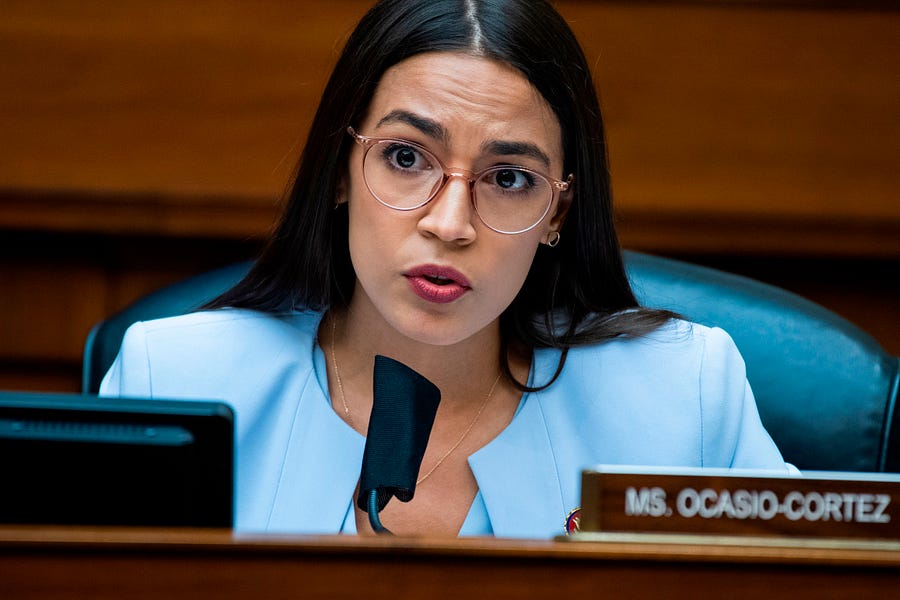Hi,
Question: Do you think the Democrats would be happy if Joe Manchin switched parties and became a Republican?
Let me rephrase that: Do you think smart Democrats would be happy if he joined the GOP?
I think the obvious answer is of course not. Republicans would take over the Senate. Mitch McConnell would become majority leader again. Biden would get fewer liberal judges confirmed, and even more Democratic legislation from the House would be DOA in the Senate.
For most of American history, this would be considered such a rudimentary bit of political analysis that the editor of a high school newspaper would find it banal. In sportswriting it’s only marginally more sophisticated than “the team that scores more points wins.”
Politico reports:
A trio of progressives who helped launch Alexandria Ocasio-Cortez’s 2018 upset campaign are now setting their sights on Senate Democrats.
The co-founders of No Excuses PAC—Saikat Chakrabarti, Corbin Trent and Zack Exley—are starting a search for candidates to challenge incumbent Democrats they say are standing in the way of ambitious action to end the coronavirus pandemic and revive the economy.
Their first targets are Sen.s Joe Manchin and Kyrsten Sinema. In an email to supporters they asked, “Help us find the next AOC to replace Manchin and Sinema.”
In 2020, Donald Trump carried West Virginia by 40 points. In 2018, Joe Manchin—again, a Democrat—was reelected fairly easily. He is the only Democrat holding statewide office.
Alexandria Ocasio-Cortez is one of the most liberal representatives from one of the most liberal districts in one of the most liberal states in America. Her district went for Clinton and Biden by even bigger margins.
Finding the next AOC in West Virginia is a snipe hunt. Snipe hunting, if you didn’t know, is a practical joke that involves sending someone into the woods to hunt something that isn’t there. The irony is that snipes aren’t a myth like the Loch Ness monster or good flan. (They’re birds.) So yeah, I’m sure there’s some West Virginia bartender or college professor or environmental activist who sees the world the same way as Ocasio-Cortez. But that’s not what people mean when they say “the next AOC.”
They think they can find someone in West Virginia with AOC’s views who can beat Joe Manchin in a primary and then go on to win the general election against a Republican.
This is what psephologists call “a very stupid idea.”
Let’s dispense with the deep dive into polls and election returns and look at something more interesting.
The inestimable David Wasserman of the Cook Political Report has found a high correlation between voting patterns and proximity to—or distance from—Whole Foods and Cracker Barrel. In 2016 Trump won 76 percent of counties with a Cracker Barrel but only 22 percent of counties with a Whole Foods. West Virginia has, by my count, 12 Cracker Barrels. If you go to the Whole Foods store locator and enter “West Virginia,” it says the closest one is in Richmond, Virginia. That’s 279 miles from the West Virginia border.
Wasserman found similar correlations between other “upmarket” establishments (Apple stores, Lululemon, Urban Outfitters) and “down home” businesses (Tractor Supply, Bass Pro Shops, or Hobby Lobby). If the AOC of Charleston spills her organic kombucha on her MacBook and wants a Genius Bar appointment, she’ll be disheartened to learn that the Apple store locator doesn’t even have West Virginia in its drop-down menu. But Tractor Supply has five convenient locations throughout the state.
In short, the hunt for the woke Kwisatz Haderach of West Virginia is going to crap out.
It’s a common observation at this point that our politics have been nationalizing at a rapid clip. Amy Walter (also of Cook Political Report) has an excellent column today illustrating the trend. “In 2001,” she notes, “30 senators—10 Republicans and 20 Democrats—represented a state that voted for the other party's presidential nominee.”
Amy cruelly didn’t include a similar stat for today, so I had to poke around myself. In 2020, according to Pew, 34 out of 35 winning Senate candidates were of the same party as the candidate who won the presidential race in that state. The one exception was Susan Collins of Maine. Just look at a map. How many Democratic senators come from Trump states or vice versa? The answer is four: West Virginia, Maine, Montana, and Ohio.
If you want to include Georgia and Arizona as red states, go ahead. But so long as the Georgia and Arizona Republican parties continue to act like it’s Caddy Day at the Bushwood Country Club, good luck rectifying that situation.
Now, I think this is a bad trend for the country. Amy notes that it’s not just partisanship. The issues that concern Republicans and Democrats most have been diverging for decades. The cultural divide is real and it’s getting wider. She writes:
We also know that the two parties don't just disagree on how to solve problems; they don't even agree on the same set of problems. This wasn't always the case, according to data compiled by Pew Research Center. "In 1999, improving the educational system topped the list of priorities for both Republicans and Democrats, and four of the top five issues for Republicans were listed among the Democrats' top five issues as well," wrote the authors of the Pew survey. "Ten years later, in the wake of the financial crisis, three issues (economy, jobs and terrorism) topped the list among both Republicans and Democrats (although they ranked them slightly differently)." By 2019, there was "not one overlapping priority between the top five priorities for Democrats and those of Republicans."
But how we reconcile these divisions is not something I’m going to tackle today, save to say one thing. America would be less polarized, less angry, less divided into “good” versus “evil” politics, if the parties themselves had more internal tolerance for dissent and ideological diversity. If every Republican politician has to be 100 percent in lockstep with the most extreme version of the party’s own orthodoxy—often defined by entertainers, activists, and demagogues utterly unconcerned with governing—more Democrats are going to get elected, and vice versa. A half-century ago, if you asked someone if they were a Republican or a Democrat, you’d have to ask some follow-up questions to find out if they were a conservative or a liberal. All things considered, that is a healthier form of politics.
Around a decade ago, conservatives began obsessing about ideological purity. When I would talk to conservative groups, I’d often hear about how we had to get rid of the “Rockefeller Republicans,” as if such people were a significant—or even existent—part of the Republican coalition. Never mind that the GOP at the time was more conservative than at any point in modern political history. (I suspect that if I were a liberal pundit talking to progressive groups today, I’d hear similar talk about getting rid of “Manchin Democrats,” or maybe “Running Dog Capitalists,” or whatever label they use.)
This was back when much of the GOP suffered from what you might call “DeMintia.” Former Sen. Jim DeMint argued that he’d rather have 30 true-believing conservatives in the Senate than 60 squishy Republicans. Another way of saying this is, “I’d rather have a veto-and-filibuster-proof majority of Democrats than a filibuster-proof majority of Republicans.”
It’s all so stupid.
Let’s go back to my original question: Would the Democrats be better off without Joe Manchin? Of course not, for the same reason Republicans would be worse off without Susan Collins. Now I disagree with Collins on a lot of things, but she was a reliable vote for all sorts of conservative causes, including Supreme Court confirmations. But her most important vote was for majority leader.
Politics in a democracy, at its most basic nuts-and-bolts level, is just about numbers. If you can get a majority of congressmen or senators to caucus with your party, you’re in the majority and you can get more of what your side wants accomplished. If you don’t, you’re in the minority, and you’ll get less of what your side wants accomplished. This means that, if you need one more person to get you to majority status, it’s better for that person to be a very liberal Republican than the most conservative Democrat. And again, vice versa. This was why James Madison changed his mind about parties. They serve to force generally like-minded factions to compromise on common interests.
Yeah, yeah. I know politics is also about big ideas, policies, cultural symbolism, yada, yada, yada. But before all that, it’s about frick’n numbers. And both parties are being run into the ground by innumerate ideologues.







Please note that we at The Dispatch hold ourselves, our work, and our commenters to a higher standard than other places on the internet. We welcome comments that foster genuine debate or discussion—including comments critical of us or our work—but responses that include ad hominem attacks on fellow Dispatch members or are intended to stoke fear and anger may be moderated.
With your membership, you only have the ability to comment on The Morning Dispatch articles. Consider upgrading to join the conversation everywhere.